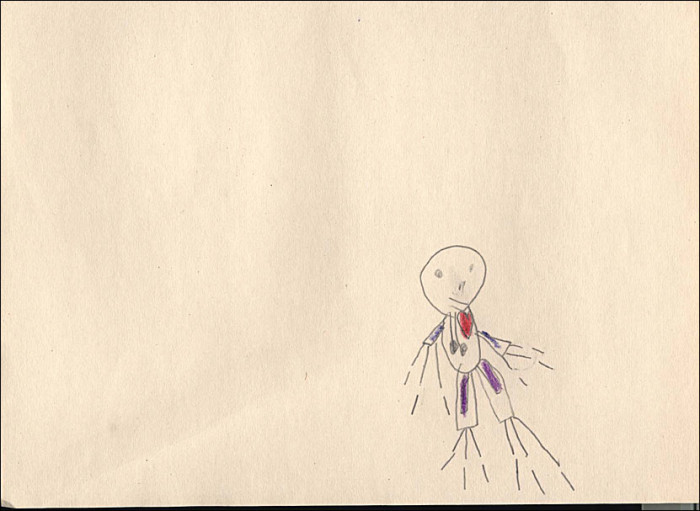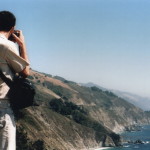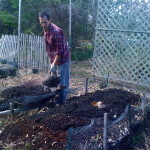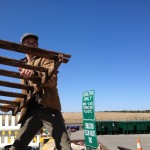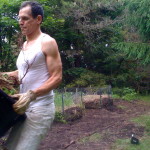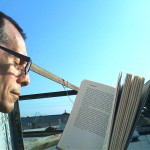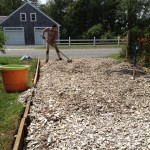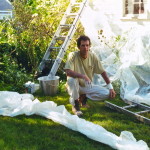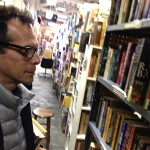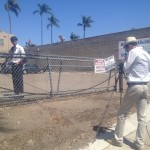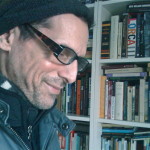an interview
On the Couch with . . .T. Ryder Smith
Most actors would find the idea of playing Queen Elizabeth I, Hitler and Ronald Reagan over the course of a career quite daunting. T. Ryder Smith plays all three characters in the same play! The play, of course, is Sarah Ruhl’s Passion Play, presented by Epic Theatre Ensemble, and it is currently generating the kind of buzz usually reserved for big Broadway hits. But this show isn’t on Broadway. In fact, it’s not even in Manhattan. This must-see event is drawing crowds in droves to Brooklyn. Ft. Green, to be exact. So if you’ve seen an extra dose of A-listers on the Downtown C Train lately, now you know why.
Good news for those of you who haven’t yet made the trip: it recently extended its run through June 5.
We wanted to see how T. Ryder Smith is holding up under the pressure, so we’ve put him on the couch.
Q: What do you consider to be your best asset?
A: Curiosity.
Q: What was your proudest moment?
A: Birth. I was a spontaneous delivery. That was work.
Q: What is your favorite drink?
A: Water without ice.
Q: What is your favorite food?
A: Pomegranates.
Q: What is your favorite condiment?
A: Celtic sea salt.
Q: What is your current obsession?
A: Trying to get the iPhone camera to take an interesting photograph.
Q: If you could give up one of your vices, what would it be?
A: Acting.
Q: What is the one professional accomplishment you long for most?
A: Retirement.
Q: What is the one thing you waste too much money on?
A: “Waste” is harsh. “Spend” is better: books.
Q: What is the one activity you waste too much time doing
A: Projecting.
Q: What do you consider to be the single greatest threat to your health?
A: Food.
Q: What is the single best trait you inherited or learned from your parents?
A: Encouragement.
Q: What is the single worst trait you inherited or learned from your parents?
A: Delay.
Q: What in the world most thrills you?
A: Honesty.
Q: What current trend in popular culture most irritates you?
A: Solipsism.
Q: What was the single most embarrassing moment you’ve ever experienced on the job?
A: It is ongoing.
Q: What is your favorite place in the world?
A: Dawn.
Q: What is the most important trait you seek in a romantic partner?
A: That they like me a little.
Q: Do you prefer the company of dogs or cats?
A: Cats, since they don’t like company.
Q: What would have to happen to make today the best day of your life?
A: I woke up 20.
Q: What is your personal motto?
A: “Okay.”
from Every Day is Opening Night blog
http://www.oandmco.com/blog/entry/t.-ryder-smith
*
*
What do I know about the life of T. Ryder Smith
by Daphne Darling
Reassured, despite her insistence to the contrary, that the birth of her third child would not occur for several hours yet, T’s mother was wheeled on a gurney into one of the busy maternity ward’s storage rooms and left briefly alone amidst step-stools and boxes of paper cups while the nurse went to prepare her a proper bed down the hall, and the doctor departed for his dinner break, at which point she sat bolt upright in what she called “instant, incredible” pain, screamed once, watched T. emerge entire, and fainted, coming to a few minutes later to see the harried nurse and still-outdoor-coated doctor rinsing T. in a utility sink and wrapping him in a sheet of newspaper, a story the hospital subsequently denied, but T. believes his mother saw what she saw.
That was on March 9th, 1958, in Nyack, NY, sometime late in the afternoon or early in the evening, no-one could ever recall, which made any later astrological chartings difficult, but T. says he isn’t sure he believes in any of that.
T. also says that the fact that he was touched by print before flesh might be why he feels so comfortable in used bookstores. And that his birth gave him an enduring horror of tight spaces. Even the mention of spelunking makes him squirm.
He was raised in Rockland County, NY, in a then-brand-new post-war suburb of curving streets and jungle-gym backyards, and says he remembers the assassination of President Kennedy, the first appearance of the Beatles on Ed Sullivan, and other things that happened on black & white TV.
His mother was a craftsperson and lover of art, a great gardener, a great cook and a great reader, and a woman who rarely threw anything away. She worked before her marriage as the executive secretary to Hans Bethe, the Nobel-Prize winning atomic scientist who later turned against the bomb, and T. still has funny postcards he sent her from his various travels. She said he really did forget to put on his coat and hat and even his socks and shoes unless she reminded him first. That was at Cornell University, where she met the man who would become T’s father, who was there getting his doctorate in chemistry. After the marriage, T’s father taught briefly at a university, was drafted into the Army and afterwards worked for many years as a Research Specialist in something called Flavor Technology for General Foods Corporation. He played some small role in the invention of Tang, for astronauts, and instant coffee, for everyone, and could still many years later spontaneously recite the chemical formulas for most things that we taste. He looked like Walt Whitman and lived after retiring on Cape Cod in the house his great-great-grandfather built.
T. has two older brothers, who work as an architect and a watch-and-clock repairman, and a younger sister, who is a horticulturalist and Master Gardener in Massachusetts. Everyone in his family is a good gardener, but he says his mother was the best.
He hated school and tried not to attend it much, insisting from the start that it is a bad way to get an education. He vividly recalls the moment in 2nd-grade where he excitedly used his just-learned skill of addition to figure out how many more years he had left of school. The answer appalled him.
He says he tried to educate himself, instead, but isn’t sure it worked.
He also never studied acting. He insists, dubiously, that he never wanted to become an actor, isn’t sure how it happened, or why, or why or how it continues to happen, and says he hopes he can stop being one someday, but he’s been saying that for years.
What else can I tell you? He owns too many books, reads a lot, writes some sort of stuff he never shows anyone, takes strange and lividly-colored photographs he rarely lets anyone see, and says he makes movies in his head, but people say they have acted in little things for him here and there. He gets heated when he talks about politics, and seems to be some sort of atheist anarchist, but then says labels like that are just about money, in the end. He says money is a big mistake.
He has a condition called Celiac Disease, which has something to do with his feeling poisoned all the time, and appears to subsist on a diet of coconut oil, peeled cucumbers and salted ice cubes. More or less. He says he often feels like he died 10 years ago, but is still walking around.
His name: the T. is some union-thing. He won’t tell me his name. I think it’s Theodious.
daphne darling is the pseudonym of a freelance writer and a member of the hinge collective
*
*
Re: Celiac Disease
by T.
I was ill for several years with a “mysterious disease” which prompted occasional speculation, and a few odd rumors, about my condition.
Exactly.
I was diagnosed with adult-onset Celiac Disease in 2001, after 2 years of serious compromises to my health. It took me visits to 10 different doctors during that time – and a variety of tests and attempted remedies – or of dismissively being told “it was all in my head” – before anyone even mentioned the possibility of the condition. I imagine, and hope, people would be more quickly diagnosed with celiac now. It took me another 8 years of experimentation with various protocols before my health returned to something approaching functionality and stability.
I would urge anyone suffering from the disease to try – with proper, and it is to be hoped empathetic, medical supervision – a Food Elimination diet. It was the single most useful thing I tried in all those years of illness and confusion and fear, and the only one that gave me any means of monitoring my condition, and of feeling at last that I might be able to improve it. I wished I had known about it long before.
And if I, as a layman with nothing but personal anecdotal experience, can say anything further, it would be to suggest that what we call Celiac Disease is a more complicated condition than is currently understood, and which may be helped by avoiding certain foods and food-families in addition to those specifically labeled “gluten-free”. But everyone needs to find out what works best for them.
I have learned that our health is emotional, intellectual, and spiritual, as well as physical.
Most of all, I know that there is hope for anyone with the condition, and that a large degree of one’s lost health can be regained despite it. Read, talk to people, observe, trust your symptoms, make connections, keep records, keep trying stuff. Tell people about it.
Good luck!
T. Ryder
I came across this drawing online somewhere, years ago, by a then 2nd-grade student named Brishen Rojas. After many health tribulations, and my researches into how the human body works, this remains the best and most accurate anatomical drawing I know. Thanks for letting me print it here, Brishen!
*
*
not acting
recent: yes


